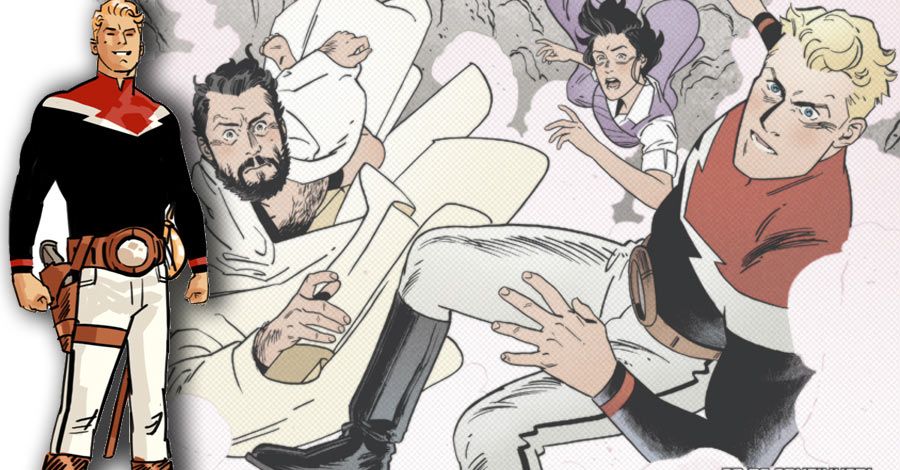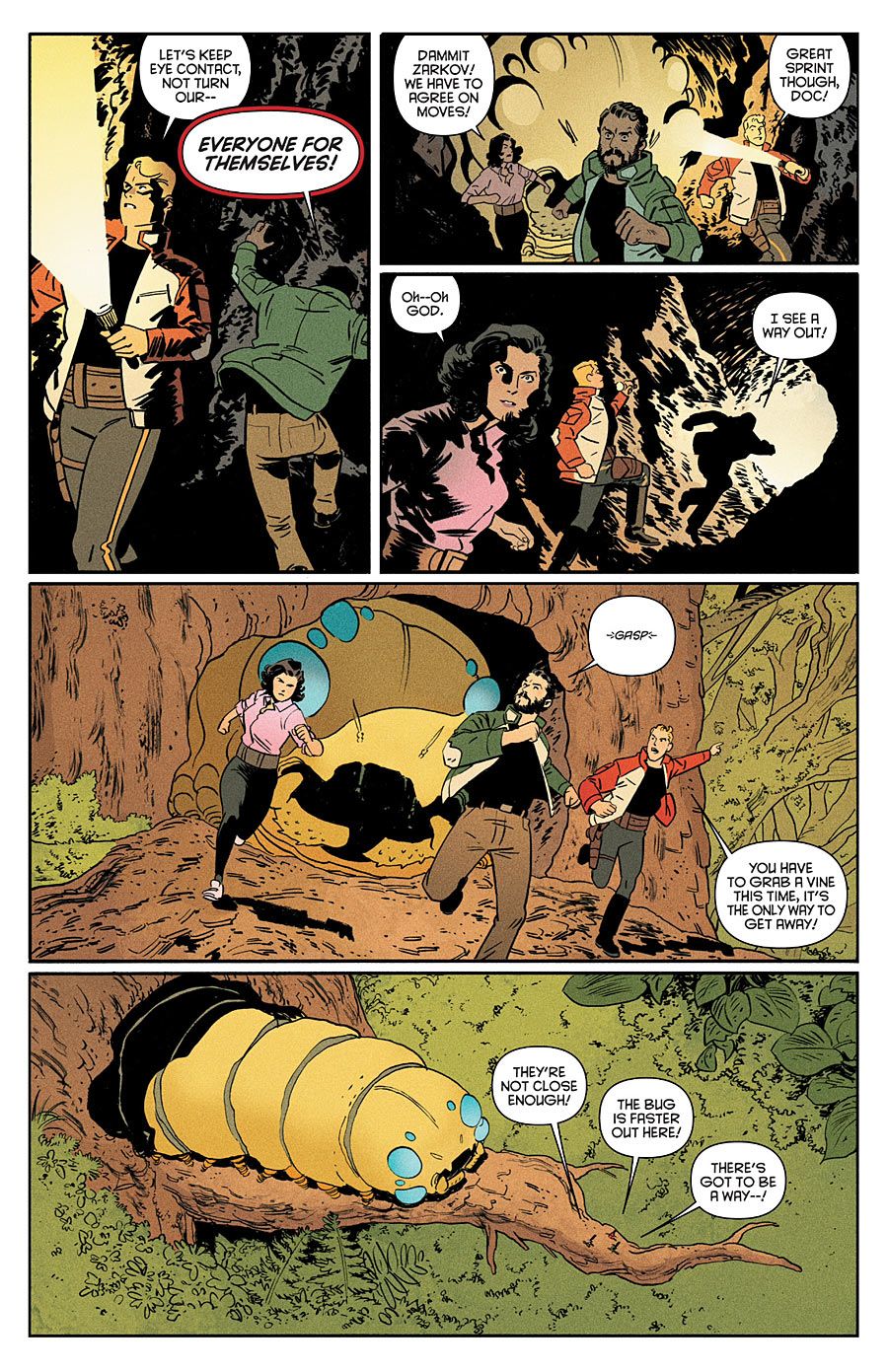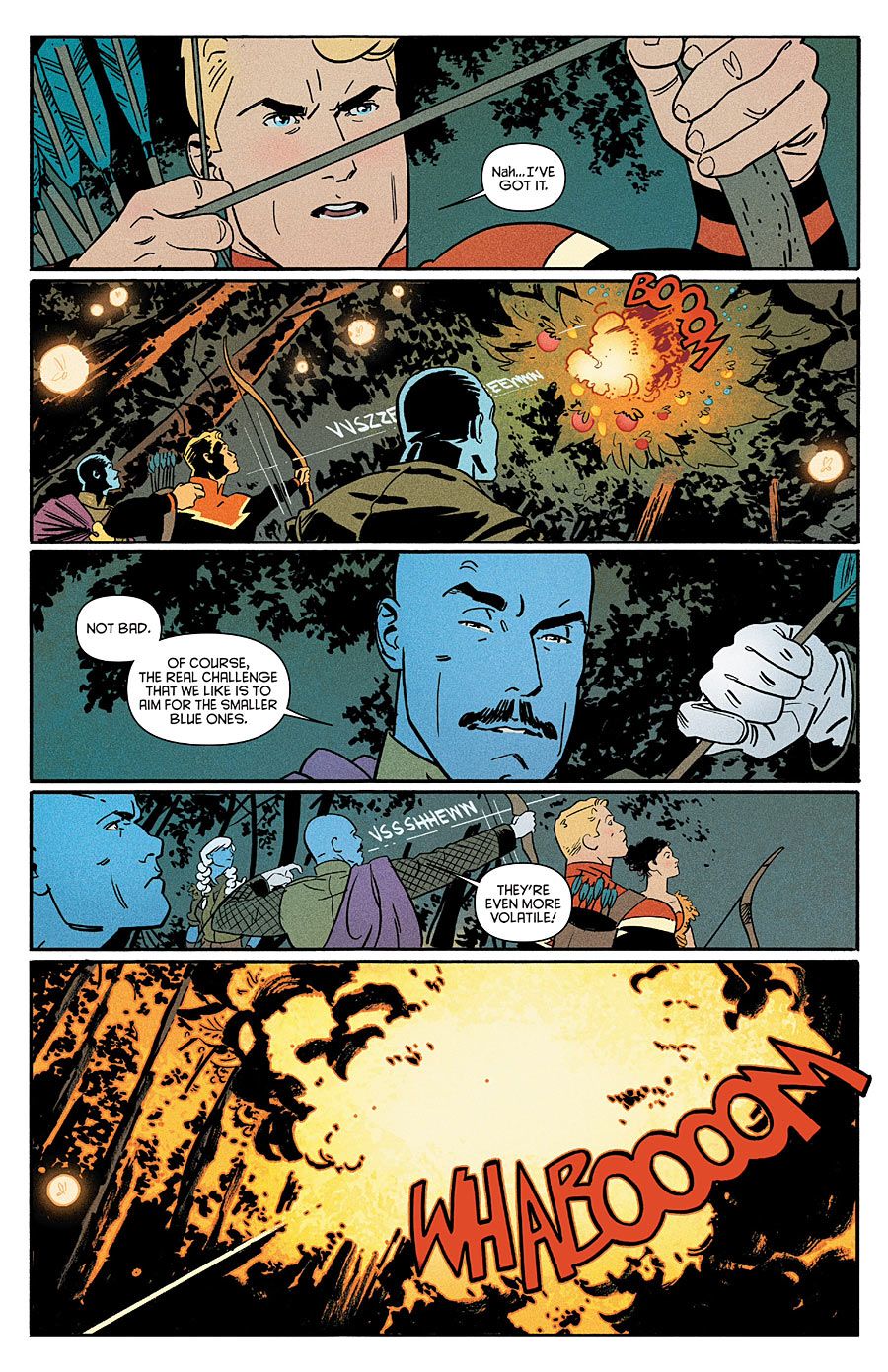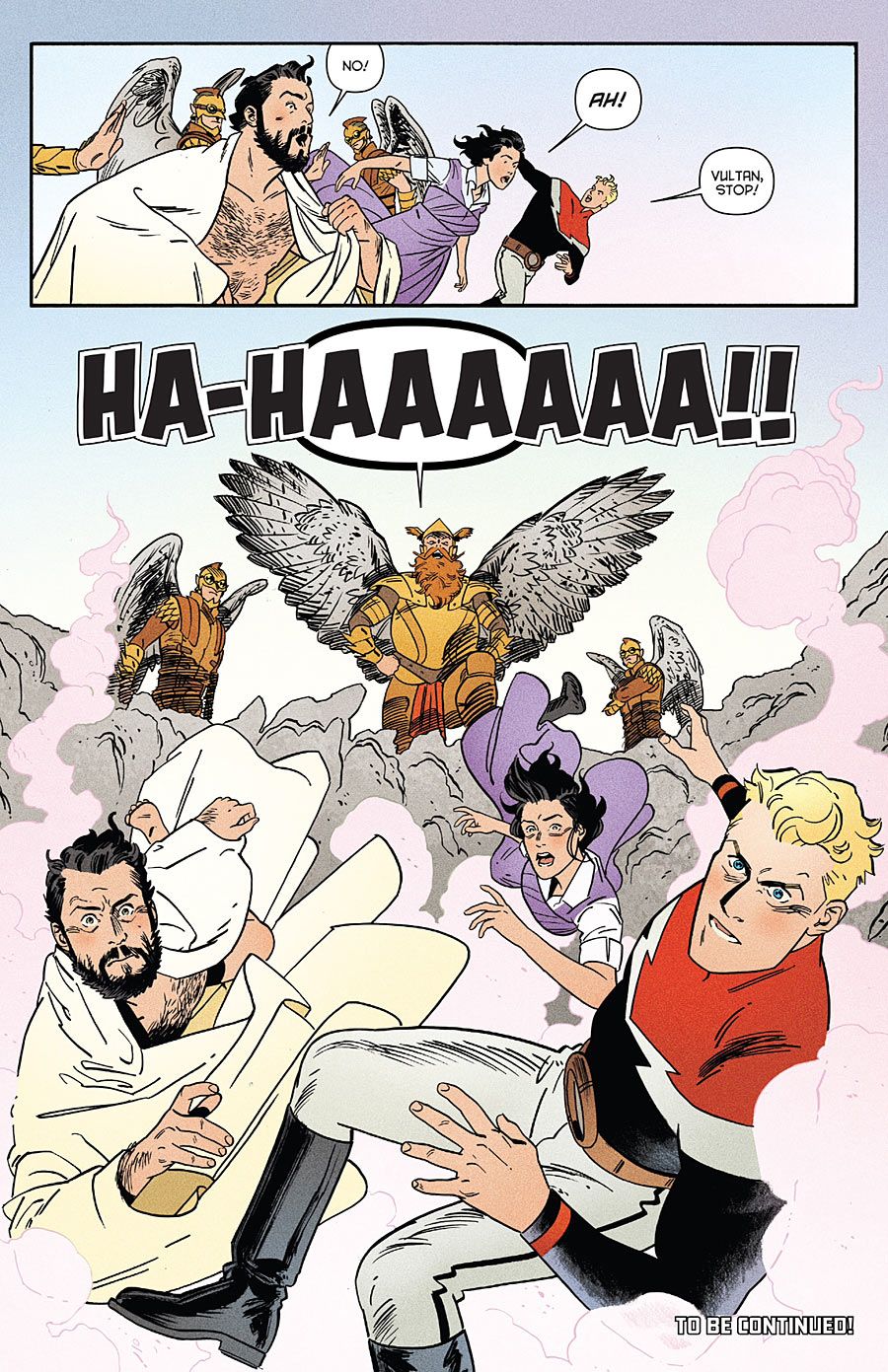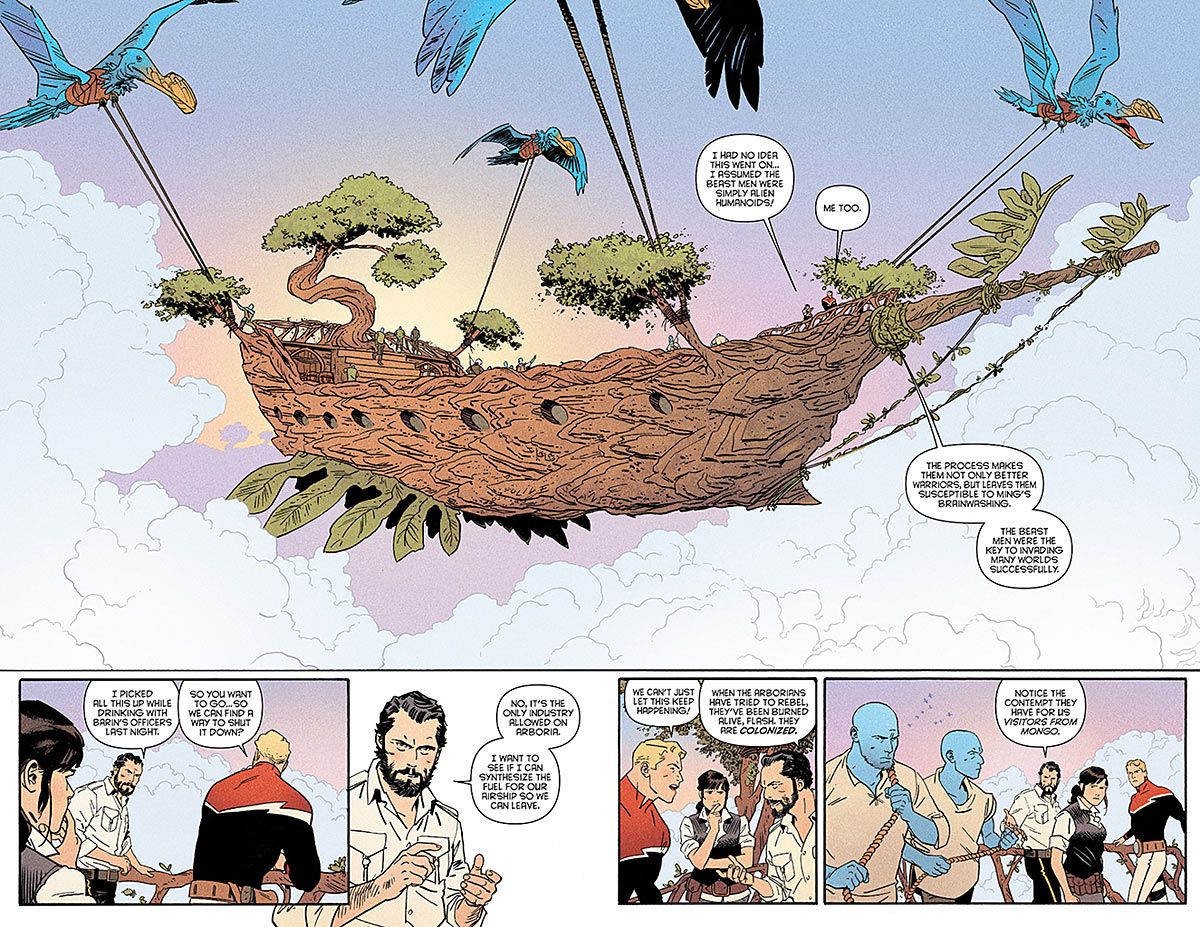As a self-diagnosed list maniac, the holiday season always arrives hand-in-hand with retrospection as I begin to prep my year-end "Best Of" lists. I've started finishing off my stack of comics that have slipped past my attention ('tis the season to get distracted by every "Frasier" Christmas episode on Netflix) and rereading select series that I've enjoyed this past year. During a recent flight to Tennessee, I loaded up my iPad with Dynamite's "Flash Gordon" series for a reread, totally unaware that I would end up falling completely in love with that series for a second time.
My love of "Flash Gordon" -- by Jeff Parker, Evan Shaner, Jordie Bellaire and Simon Bowland -- proves that readers should never declare themselves strictly loyal to one publisher, genre or character. I have never been a fan of "Flash Gordon." When I was a little kid, my older sister's then-boyfriend gave me some of DC's late-'80s "Flash Gordon" comics along with a plastic bag filled with '70s "Star Wars" issues. I loved "Star Wars" and never touched "Flash Gordon."
To prove just how little I know about the character, I will present every fact (?) I think I know about the property -- without fact checking. The character debuted in movie serials back in the 1930s that directly inspired George Lucas' structure for "Star Wars." He also starred in newspaper strips and a bunch of comics from a bunch of different publishers. There was a feature film in the '80s and Queen did a song -- or maybe they did the entire soundtrack, Prince/"Batman"-style -- that music aficionados either love or hate. Flash Gordon is not an alien -- I picked that up through context clues in the current series. He also doesn't have real super powers... I think? He does a lot of sick jumps, though. Flash Gordon has always occupied the space in my brain devoted to properties that were big seventy years ago that can't seem to make a dent nowadays, like the Phantom and the Shadow.
Jeff Parker Blasts Dynamite's New "Flash Gordon" Series Into Orbit
It turns out the way to get me to buy a book that is incredibly far outside of my comfort zone -- it's not Marvel and it's not mutants -- is to put some of my absolute favorite creators on it. I would buy sexy fairy tale comics or unauthorized celebrity bio comics if they were written by Jeff Parker, drawn by Evan Shaner and colored by Jordie Bellaire. I love their work independently, but them working together is like mixing milk chocolate with dark chocolate and white chocolate (I'm aware that my taste buds get pleasure out of redundancy).
For those of you that haven't read the latest "Flash Gordon" series, let me break it down for you, slightly-informed newbie to newbie: Ming the Merciless is a world-conquering evil emperor type and his attempt to add Earth to his collection was thwarted by Flash Gordon, a gregarious, barrel-chested and good-natured hunk who enjoys bungee jumping and wrestling with every giant creature he comes across. He hangs out with Dale Arden, a hard-nosed science reporter who at times dresses like Han Solo, and Professor Zarkov, a drunken scoundrel of a scientist with an undefeatable ego. Together, these three travel from one Ming-controlled world to another, helping spread the seeds of rebellion.
See how eloquent that was compared to me explaining my prior "Flash" knowledge? I got all of that from the very first issue, which features the trio already on the run from Ming's army and hopping from one world to the next. Parker doesn't let the character's 80-year history (I've started looking up facts, okay) weigh him down. The reason I've remained ignorant of "Flash Gordon's" history is because Parker has never once left me scratching my head by a reference or a reveal. Everything within the seven issues feels self-contained and, perhaps most importantly for a classic character, new.
There is something both traditionally brilliant and devilishly subversive about all the work Jeff Parker does. You'll most often find him on books with well-established characters -- Hulk, Aquaman, the Thunderbolts and Flash Gordon, to name a few. He writes superhero stories that feel like superhero stories, but that tried and true format merely serves as the backdrop for what makes Parker stand out. This guy gives his characters some of the most realistic and enjoyable dialogue I've ever read. His characters make bad jokes at inappropriate times, wield sarcasm like a weapon and jump back and forth between pride and empathy like real people. They express annoyance by saying "Booooo this" and confront attackers by shouting "Everyone for themselves!" They drink, fib and eat constantly and rearrange their priorities on the fly. All of these characterizations pop when placed against a classic style pulp-hero story.
As great as Parker's scripts are, they wouldn't have worked as well without artist Evan Shaner. I first discovered "Doc" Shaner years ago, possibly through his involvement with Comic Twart; I know I commissioned a Danielle Moonstar from him back in 2011. I've watched his art grow from great to somehow-even-greater over those years, and even during this recent "Flash Gordon" stretch. Shaner's art is just so unquestionably good. His art feels like pure comics to me. For a guy rocking his first ever ongoing series, his storytelling and acting chops are up there with the best in the business. Every joke lands because Doc knows how to twist a smile or raise an eyebrow the exact right amount, and every double-page splash featuring an otherworldly wonder inspires the exact right amount of awe. Also, and this is something I'll expand on in a sec because of course I will, he's a member of the exclusive club I have for artists that draw my type of handsome man.
Shaner's linework leaves a lot of room to work with, which means that colorist Jordie Bellaire really nails down the tone of the book. Since Parker's scripts feature modern character work and Shaner's art feels in line with Silver Age geniuses, Bellaire's colors are what really tie this book to its 1930s roots for me. We're not getting the moody "Moon Knight" Bellaire, nor are we getting the savage pop colors she gave us on "Journey Into Mystery" or the lush yet muted tones of "Pretty Deadly." Bellaire's color choices on "Flash Gordon" feel as bright, fun and optimistic as Parker's words and Shaner's art. That's why her palette feels so classic to me; it feels untouched by the grit serialized comic storytelling has accumulated over the decades. Everyone's cheeks are rosy and even the hostile aliens have an inviting glow about them. This book feels welcoming because of Bellaire's work.
If my praise of the creative team hasn't won you over, then maybe shirtless Zarkov will. Yep, we're at that part of the column! In "Flash Gordon" #5, the siren-esque bird ladies of Sky World take Flash and Zarkov hostage. This arc has everything I love about this series: Parker's humor (the hero guys singing their names out loud), Arden being a bad ass (she hops right into rescue mode!), Bellaire's beautiful colors (the rainbow-tinged Sky World atmosphere) and Doc Shaner finally giving readers what they want with shirtless Zarkov. Before "Flash Gordon" #6 hit the stands, I placed Z at #8 on my list of "Hottest Comic Dudes." The inebriated scientist's two-issues of shirtless cavorting may have bumped him up to #5.
Here's why I talk about hot comic dudes so much, and why I care so much about shirtless Zarkov: someone's gotta. Specifically, someone has got to be vocal about the fact that "sexy" and "muscles" should not always go hand in hand. For example, I love that the newly-revealed "Justice League" movie variant cover by Emanuela Lupacchino pays homage to "Magic Mike" and sexes up the male heroes without slipping into the "male power fantasy" mode that a lot of attempts at beefcake do. Those are heroes drawn to be ogled -- while still possessing agency -- and it's great! It's a nitpick of a gripe, and I don't mean to detract from the obvious step forward that cover is, but I do get a little annoyed when all of media continually tells me that the men I should be attracted to are smooth dudes with muscles. The type of guys I like, of the average-ish build and hirsute persuasion, rarely get sexualized with sincerity, very rarely appear in comics, and very rarely appear in comics shirtless. I'm just saying, it was delightful to see that side of Zarkov in "Flash Gordon."
Also, Flash Gordon himself possesses various levels of hunky and adorable Chris Pratt-esque charm. The guys in this book can get it.
Shirtless Zarkov rant out of the way, I will now admit that I'm a bit bummed that this volume is concluding. But you know what? It's concluding on its own terms and I am fine with that. I'm excited to see what these creators do next (a two-part "Shazam" miniseries for DC next spring, which will be my first ever Shazam purchase). I'm not a Flash Gordon fan in the way that Flash Gordon fans are Flash Gordon fans, but I now have a run with this character that I truly love and will read and recommend to people for the rest of my comic-buying life. The right creative team took a group of characters I didn't know and made me care, and I'm prepared to do that again with anything else they do together -- even if it's an unauthorized bio comic of Barbara Walters.
Oh wow, actually, that would be pretty awesome.
Brett White is a comedian living in New York City. He co-hosts Matt & Brett Love Comics, writes for the sketch comedy podcast Left Handed Radio, and makes videos for the Upright Citizens Brigade as a member of UCB1. His opinions can be consumed in bite-sized morsels on Twitter (@brettwhite).

